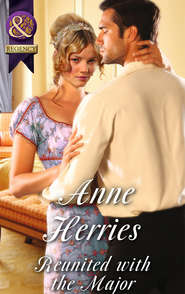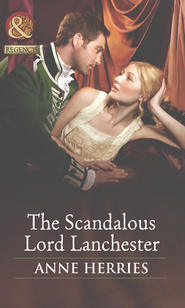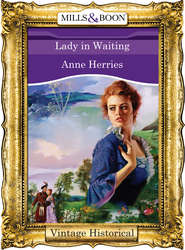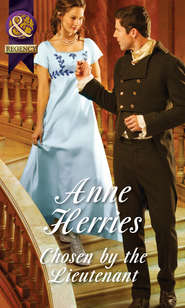По всем вопросам обращайтесь на: info@litportal.ru
(©) 2003-2025.
✖
Marianne and the Marquis
Настройки чтения
Размер шрифта
Высота строк
Поля
‘Yes, of course. You will need some money in your purse and I was wondering whether I might sell my pearls…but now I can give them to you to wear, for you have nothing but your silver locket.’
‘Oh, Mama…’ Marianne glowed. ‘I shall keep them safe and give them back to you when I return. And I want you to take the ten pounds you spent for my clothes today, if you please. Ten pounds is more than enough for me.’
‘I shall take five, if you wish,’ Mrs Horne said. ‘Perhaps Lucy and I will have a day in Huntingdon when you two are away.’
‘Please take the ten pounds,’ Marianne said. ‘I felt very guilty to be spending all your money, Mama. You may need it and I shall be quite content with what I have.’
‘Had we known he intended to give you something we might have purchased all three of those pretty gowns, my love,’ Mrs Horne said, looking regretful.
‘I am very pleased with the material we bought, and that roll of blue velvet from the market was so cheap that there is enough for both Jo and Lucy to have something as well.’
‘You have such a generous nature,’ Mrs Horne said. ‘Your papa told me so often that you would make all our fortunes, because you were bound to marry well. He was sure that one day you would meet a young aristocrat at your uncle’s house—or a guest of the Marquis of Marlbeck…’
‘I have never met anyone I liked particularly at one of Aunt Wainwright’s dinners,’ Marianne said. ‘All her friends seem so proud and disagreeable, Mama. And you know that we were never invited to dine at Marlbeck, though of course we went to the open day in the garden as all the marquis’s neighbours did.’
‘Well, he has died, poor man,’ Mrs Horne said and sighed. ‘As yet no one has met his heir. I have heard that he spends most of his time in London, but I do not know how true that may be.’
‘Even if he lived here, it would change nothing,’ Marianne said and smiled at her mother. ‘He is probably very proud—like his uncle—and I am sure he would not wish to marry the daughter of a parson, even one as beautiful as Lucy.’
‘Well, it does not matter,’ her mother said. ‘All I want is for you to be happy, dearest. If it pleases you to marry a good man with no fortune, I shall not blame you.’
‘Oh, Mama,’ Marianne said, smiling at her through eyes misted with tears. ‘We were all so fortunate to have dearest Papa. I am sure that none of us would consider marrying a man who did not match up to him.’
Alone in her room later that night, Marianne sat at the window and looked out at the night sky. The garden was in shadow—the moon had gone behind clouds and there were no stars to be seen. She had opened her window wide, because it was a warm night and she did not feel like sleeping. Her thoughts were busy with the visit to her great-aunt and her hopes for the future. Marriage had been a distant possibility until recently, because she had known that the lack of a dowry might hamper her chances, even if friends and family universally acclaimed her as a beauty. Her father’s curate, Thomas Rowan, liked her very much, possibly enough to ask her to marry him, but he could not afford to take a wife just yet and Marianne was not certain of her answer if he did ask her.
However, she was relieved that she had been spared the visit to Bath with Lady Wainwright, for she would not have cared to be paraded on the marriage mart. Her only true experience of high society had been met with in her aunt’s house, and it had led her to have a dislike of aristocrats. She much preferred the company of ordinary, good-natured folk like her papa and the neighbours she was accustomed to meeting.
She was not surprised when she heard a knock at her door and then Jo came in, dressed in a white nightgown with pink embroidery about the high neck. She smiled when she saw that Marianne was not in bed, perching on the side of it and tucking her feet underneath her.
‘I saw that you had not blown out your candle,’ she said. ‘I could not sleep for thinking of Lady Wainwright. If she does ask I must go, if only for Lucy’s sake. I am sure I shall not meet anyone who wishes to marry me—and I shall not care for that—but if I do not show willing, Lucy may never get her chance.’ Both sisters were extremely fond of their young sibling and thought her perfect in every way.
‘If Aunt Bertha had kept her house open in London, she might have invited us all there,’ Marianne said with a little frown. ‘I know Mama visited London with her once, and had hopes that we might be invited again. I do not mind for myself, Jo, because I would as soon not marry a man of high birth—but Lucy ought to have her chance.’
‘You are the beauty,’ Jo said and looked at her elder sister fondly. ‘Lucy may match you in a year or two—but I am cursed with this!’ She scrunched up her red hair, which curled into ringlets naturally and was the bane of her life. ‘But I know you do not wish for a grand marriage. Perhaps you will meet a pleasant gentleman…someone like Papa…’
‘Yes, that would be the most fortunate thing,’ Marianne said and smiled at her, in perfect agreement. ‘But I am not sure that another such could be found…’
Jo nodded—their father had been the best of men and they both still mourned him sincerely. ‘Well, I suppose it would be unfair to compare other men to his image,’ she said. ‘But it would suit you to be married to a clergyman, I think.’
‘Yes, perhaps,’ Marianne agreed. ‘Though I should like to be loved and to love…’
‘Romantic love.’ Jo laughed a little scornfully. ‘I think Mama and Papa cared for each other, but I am not sure that I believe in true love the way Lucy does.’
‘No?’ Marianne smiled at her sister. ‘I think if one is lucky it does happen, dearest—but undoubtedly many marriages are for reasons other than love.’
‘Such as the marriage Aunt Wainwright would have had you make?’ Jo looked angry. ‘As if you were not far more beautiful than Annette could ever be! She is nothing beside you.’
‘Jo dearest,’ Marianne reproved with a loving look that robbed her words of their sting, ‘you must learn to curb your tongue. It just will not do to say such things in company.’
‘Well, my aunt need not take me if she is afraid I may shame her,’ Jo said defiantly. ‘I am happier at home and would tell her so, except that it might rebound on Lucy—and you also if Great-aunt Bertha sends you home with nothing.’
‘I am going to visit her because I care about her,’ Marianne said. ‘I do not think of a reward, despite Mama’s hopes. I know she worries for us, but I do not particularly mind being poor, Jo. I just wish Papa were still alive. I miss him.’
‘We all miss him,’ Jo said. ‘As for Aunt Wainwright suggesting that Mama might marry again—and Papa hardly cold in his grave!’
‘Yes, it was thoughtless of her,’ Marianne agreed. ‘But I dare say she does not realise how loving Mama and Papa were together.’
Jo nodded and yawned. ‘Well, I suppose talking will not change things. I shall go to bed and allow you to sleep. We must be up early if we are to have that new afternoon gown ready for you in time…’
‘Goodnight, dearest.’ Marianne kissed her cheek.
After her sister left, she got into bed and blew out the candle. However, she lay awake, thinking for some time before she drifted into a peaceful sleep.
Drew stood in the library of Marlbeck Manor, glancing around him, his eye passing over row upon row of leather-bound books that gave the room its immaculate appearance. Not a book out of place, most of them as untouched as they had been the day his uncle had bought them, by the yard in all probability, and few of them worth reading.
His boots rang on the marble floor as he strode into the hall, echoing in the emptiness of what felt like a huge mausoleum. The house was a magnificent piece of architecture, furnished to the highest standards and stuffed with valuable objects from gold snuff boxes to Chinese vases and oil paintings that had been perfected by a master long ago, and he hated it. It was not a home, had never been home to him. For two pins he would sell it or tear it down and build something more comfortable, and yet that would be sacrilege. And he knew that it didn’t belong to him; he was merely the custodian, and he must pass it on one day to someone more deserving.
Perhaps it wasn’t the house that he hated, Drew thought as he stared at a reflection of himself in a magnificent gilt-framed mirror. Maybe it was his life—himself. Since he had been forced to resign from the army and come home to face his responsibilities as the eleventh Marquis of Marlbeck, he had become aware that he was almost as empty as this vast house—empty of anything worthwhile.
He frequented the clubs when he was in town, drank with other young gentlemen, drove his horses and sparred to keep himself fit—but where was the point of it all? At least when he was out there in the thick of battle, not knowing from day to day whether he would survive, he had known who he was and what he wanted of life. Now there was nothing but the prospect of the lonely years stretching ahead.
But at last there was something he could do—something that might ease the anger he had held inside him since his friends were killed…betrayed by a traitor who had traded their lives for gold. If he could bring that man to book, it would at least give some purpose to his life.
His eyes gleamed, self-mockery driving away his fit of the blue devils as he shouted for his manservant. He had promised Jack he would do what he could, and now that his duty was done here for the moment, he would keep his word. Suddenly, he felt better than he had since he came home. It would be a mad adventure, perhaps his last before he did what he knew to be his duty and settled down to finding a wife in order to provide an heir for the estate.
But where would he find a wife that he could bear to live with for more than a month? Most of the young ladies that were paraded under his nose every time he attended a social affair would drive him to distraction within hours. He needed…wanted…he did not know. At times there was a yearning need in him, but he had no idea what it was that he needed…
Suddenly he laughed out loud, the sound of it echoing in the vast hall. What a damned fool! He was like a wounded dog, howling at the moon for no other reason than a feeling of deep loneliness inside.
Chapter Two
Marianne glanced at the woman sitting opposite her in her uncle’s comfortable carriage. Lord Wainwright employed Sally as the housekeeper’s assistant, and he had insisted on sending her with his niece, because she was five and twenty and a capable young woman.
‘You will need to break your journey for at least two nights, and if there should be an accident to the coach you might be marooned at an inn for a day or so while the repairs are done. I should be anxious if I thought you alone, Marianne. You are still young and innocent, though I know you are very sensible. However, I should feel easier in my mind if you had Sally Jones to accompany you, because she will look out for you, my dear.’
‘Then I shall be very happy to have Sally as my companion for the journey,’ Marianne told him. ‘You have been so considerate, Uncle, and I cannot thank you enough.’
‘You are a good girl and deserve every consideration,’ he had told her and kissed her cheek.
So far her uncle’s fears for her journey had proved unfounded, but it had passed the hours more pleasantly having someone to talk to—though Sally had been sleeping for the past hour or so. Marianne might have followed her example, except that she enjoyed looking out of the window. Her thoughts were already with her great-aunt. It was some years since she had seen Aunt Bertha and she was wondering if she might find her much changed.
Suddenly, the coach halted amidst a jangling of brasses and some juddering that shook Sally awake, making her rub her eyes and look at Marianne in bewilderment.
‘What has happened, miss?’
‘We have stopped for some reason,’ Marianne said. She looked out of the window. ‘I think there has been an accident to a coach ahead of us…yes, it appears that several men are helping to push it to the side of the road.’ She opened her door and got down, looking at Lord Wainwright’s groom as he came up to her.
‘I had to stop, Miss Horne. I’ll give them a hand and then we’ll soon be on our way again.’











